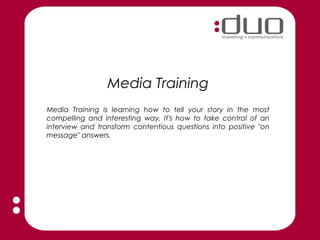
Media Training: Your Message
- 1. Media Training Media Training is learning how to tell your story in the most compelling and interesting way. It's how to take control of an interview and transform contentious questions into positive "on message" answers.
- 2. Media Training Your message Media interviews in general TV Interviews Dressing for TV Prerecorded TV interviews Radio interviews Crisis management Role play
- 3. THE MEDIA
- 4. IMPACT OF POOR INTERVIEWS BP OIL SPILL IN THE GULF (2010)
- 5. TONY HAYWARD QUOTES during BP Gulf Coast oil Spill disaster April 29, 2010 After the Gulf Coast oil spill occurred, The New York Times reported that Hayward said to fellow BP executives, "What the hell did we do to deserve this?" Environmentalists and the families who lost loved ones in the explosion could ask the same question.
- 6. May 14th, 2010 In one of his most famous gaffes, he told The Guardian "the Gulf of Mexico is a very big ocean. The amount of volume of oil and dispersant we are putting into it is tiny in relation to the total water volume.”
- 7. May 18, 2010 "I think the environmental impact of this disaster is likely to be very, very modest," Hayward told reporters. That same day, when asked about whether he was able to sleep at night in light of the oil spill's disastrous effects, he replied, "Of course I can."
- 8. May 31, 2010 Hayward told reporters, "The first thing to say is I'm sorry." However, he continued, "We're sorry for the massive disruption it's caused their lives. There's no one who wants this over more than I do. I would like my life back."
- 9. Meanwhile, in the media… • Reports of whistleblowers claiming there were no safety measures • Coast guard was being quoted as saying it’s the worst disaster he’s ever seen •Images of wildlife and the families of victims of the explosion
- 10. Some words to describe his actions included: • “dismissive” • “callous” • “incompetent” • “deceptive” • “inept” • “arrogant” •“tried to minimise impact”
- 11. Lessons to be learnt • Sloppy answers are what damages your reputation. • Never underestimate a media interview’s potential harm or help to your career. • One bad story can rarely destroy you – but many bad stories definitely will • Reporters do not need permission to quote you – be careful of what you say.
- 12. Start by determining a message • Focus on 3 key messages in an interview and start with the most important first • Try to state your message in 30 seconds
- 13. Getting the message across • Flesh out your main points with case studies. • Remain conversational. • 5-part questions only need one answer. • Never guess. • Never say no comment.
- 14. NO COMMENT? 1. Yes, I have the answer and here it is. 2. No, I don't have the answer, but I'll get it for you. 3. Yes, I do have the answer, but I cannot discuss it. In today's world, you're going to have to deal with the issue sooner or later. Sooner means on your terms. Later means on everyone else's. - Eric Bergman
- 15. Media interviews – Before the Interview Practice the answers and messages Research the angles Be prepared to tell brief anecdotes and short stories and tie them to your message: “We examined the technology and felt no one had developed a low cost, turnkey solution in digital publishing, which led to the development of Snapplify.” Avoid trying to be humorous or telling negative stories.
- 16. During the interview - The art of the soundbite • Interesting enough to attract attention, powerful enough to be remembered Good sound bites include: • Analogies, Bold action words • Emotions and examples (the more personal the better) • Attacks and absolutes, Rhetorical questions
- 17. For more on Media Training, contact us on our website www.duomarketing.co.za • How to write a soundbite • Media interviews – during the interview • Dealing with journalists • Media interviews – after the interview • TV interviews • Negative gestures • Dressing for TV • Pre-recorded TV interviews • Radio interviews
